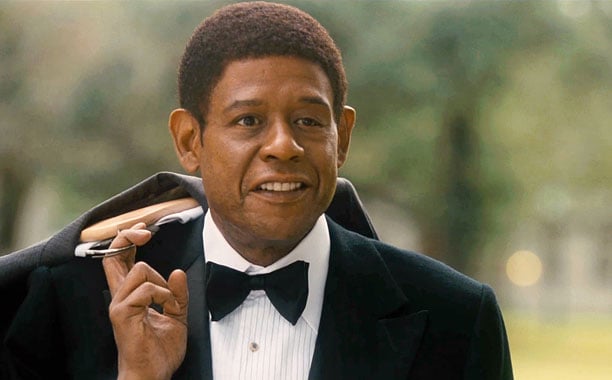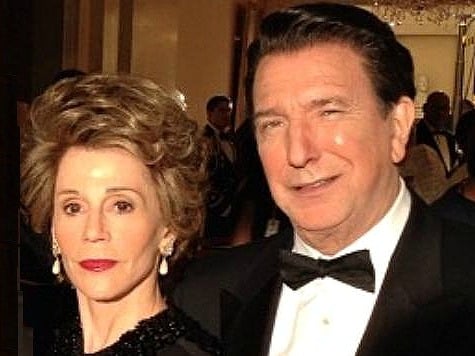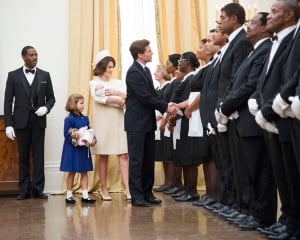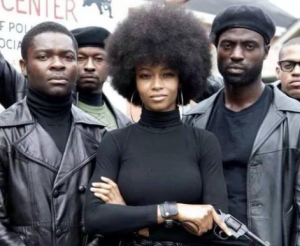Over at PJ Media, John Boot has written a devastating take down of The Butler, the movie loosely based on the long-time White House butler Eugene Allen.
He says it is false, overstated, and attacks Reagan. The same general complaints appear from Will Allen on National Review, my friend Christian Toto at Big Hollywood, and probably elsewhere on the web.
I’m going to have to disagree with my conservative brethren. I’m as conservative as they come, mostly, and I’m wondering if we saw the same movie. I loved it. My review is here.
Lee Daniels has made a film that works and moves precisely because it is about a man and a family. It is epic in scale (like the film to which it’s often compared, Forrest Gump), and meant to show the vast experience of black people in the 20th century through the lens of one man and his family.
The point of the film is to show the perspectives of black people over the decades of the 20th century, not to be a history channel documentary of all the presidents. In fact, the presidents are minimal characters.
And we conservatives are mad because it doesn’t lionize Ronald Reagan?
Correct me if I’m wrong, but I don’t recall a lot of African-Americans being big Reagan fans in the 1980s. (I was a child during that era, but I lived near Oakland and am pretty sure my impressions are correct.)
Are conservative pundits wanting to do what they accuse the film of doing and rewrite history? Do they expect a film to portray African-Americans as loving Reagan’s policies?
The genius of this movie reflects the genius of Lee Daniels’ earlier Oscar winner Precious: Based on the Novel Push by Sapphire. I am increasingly convinced that Lee Daniels, as much as any director, wants to tell true stories. The true stories he wants to tell are about African-American people. He did not set out to make Precious be a takedown of the social services system, but it was because that was a true story.
We need more, not less, of this in our culture because exploring the African-American experience through film is exploring our shared history and creates a conversation we all can share.
The conversation will not go very far if we conservatives immediately overreact to perceived slights in an excellent film.
The skill of the screenplay and direction in The Butler make it clear that the political views in the movie flow from and are expressions of the characters in the film. The movie itself does not make judgements on any of the presidents, but some of its characters sure do. And some of the characters disagree with each other.
That’s called good movie-making.
I think it is a beautiful and moving film for anyone to enjoy. Even whites. Even conservatives. Especially white conservatives. Try to understand the other side a little. Buying a movie ticket isn’t conceding every political point made by a character in the movie. It is simply learning.
But, because I think John Boot’s column does a disservice to the film and to conservatives in general, I will speak to each of his points. (Warning: Spoilers ahead.)
1) It overstates its case by adding elements to the story that are not true in Eugene Allen’s life.
So what?
It’s a movie and, as in Forrest Gump, the main character is supposed to stand in for every man. This time, every black man. Daniels never marketed it as a completely true story.We can argue that lynchings and rape by the white overseer would not have happened in that day and age, but I think black people’s experience feel like they came out of that history, that that history is theirs. An African-American everyman would feel wrong if it did not have an echo of that.
Plus, let’s not in the specifics of that case, imply that racism did not exist in Jim Crow America. Perhaps my black neighbors on Capitol Hill in DC never witnessed a lynching, but I personally know people who were denied a year or two of school because the schools shut down rather than integrate. It was real. Too real.
Finally, the two sons, one of whom becomes a radical and the other fodder in Vietnam, represent different sides of the African-American experience at the time. It’s called a plot device and it works very well in the film.
2) Everything happens to one person.
That’s what happens in a movie.
3) It says Ronald Reagan was an enemy of Civil Rights.
Characters in the movie do make this claim, but only someone bruising for a fight would say that the movie itself does. In fact, Reagan is treated rather well in some ways. He’s not shown as stupid or checked out. He’s not shown as boorish. He is not a caricature. He’s depicted as a decent man.
In fact, a long-standing plot point in the movie is that Cecil Gaines (as Allen is renamed in the film) and other black employees are paid less and given less chance of promotion than their white counterparts. JFK doesn’t fix that. LBJ doesn’t fix that. Reagan does.
It is through the personal intervention of Reagan that Gaines is able to right that wrong (somebody fact check THAT!) in the film. Plus, Nancy (played by Jane Fonda, who does not make her a caricature either, amazingly) appreciates Gaines and invites him as a guest to a state dinner.
The issue of sanctions for South Africa is an issue in the movie because it is an issue for the characters. In other words, the movie is not ABOUT whether Reagan was against sanctions, but it is the point that the characters revolve around for a while.
Cecil Gaines, for a number of reasons, not the least of which is that he is in his eighties, is ready to retire and so he does. He then joins his son, who has become a Congressman, to protest for sanctions against South Africa. He does not retire in protest of the sanctions policy. That would be a simplistic reading of a complex movie. The protest itself is really a vehicle for the reconciliation of father and son. Cecil is not so much protesting the sanctions as telling his son that he is important to him. It’s a family story first and a historical story second, which is why it works so well.
Again, the movie depicts the viewpoints of black characters at that time. Are we as conservatives going to argue that black people were happy with his policy on South Africa? That’s ridiculous. We can, however, take this opportunity to point out he was ultimately right.
Finally, each president is presented, briefly, and humanized. Kennedy is sympathetic, glamorous and kind, but also addicted to pills and a bit naive. LBJ is considered by the characters as good on Civil Rights, but someone who barks orders from a toilet. Nixon, yes, is presented as slimy.
But, really? We’re mad because a movie presents Nixon as slimy? Really, conservatives? Can we just concede that one?
And even he (played by John Cusack) has his moment of pathos, as he sits alone, deserted by all his political friends, planning a comeback that would never happen, reaching out for sympathy from his butler and finding it’s too little too late.
A very nice scene.
4) The Black Panthers Were Great Guys
Ok, here I have to just say “what the what?” to John Boot.
Ahem…What the what?
The Panthers were clearly portrayed as going too far, which is why Louis, the son played by David Oyelowo, ultimately rejects them, losing his lady love in the process. “Are you really ready to kill people? I’m not,” he says to the woman he’s shared protest, arrest, and agitation with since college. She is. He isn’t. He leaves.
There is some wistfulness in the film that the inspiring vision of the Civil Rights movement, of being gentle yet firm, demanding rights but hurting no one, turned into something as ugly as the Black Panthers.
This is what we call a story arc. Yes, Louis Gaines joins them. Yes, he’s enthralled by them for a while. But utimately, he rejects them unequivocably.
To portray the film as pro-Black Panther is just dishonest.
5) It casts the term “house slave” as something to be ashamed of
This feels a little creepy to me, to be honest. Slavery is, of course, something of which we should be ashamed as a nation.
But when I read past the bullet point, that’s not what John Boot is saying. To quote:
Whitaker’s butler character is portrayed as the ultimate house negro, and is denounced as such several times. Though the butler is the hero of the film and is given excellent reasons in his back story for not wishing to be a troublemaker, The Butlerisn’t subtle about pushing the audience to think there is something pathetic about a man who simply kept his head down and did his job for many years instead of agitating for change.
In fact, distaste for being lumped in with such so-called house slaves can be a destructive idea for youngsters just starting out on the economic ladder. Everyone who isn’t born rich has to take orders when they’re just starting out.
I think this is a another dishonest reading of the movie. The movie holds at its core a tension between being a “house slave” versus being a rebel. Cecil is the ultimate “house slave” (or the movie uses a more brutal term). His son Louis becomes the ultimate fighter. Louis despises his father, at times, for his perceived subservience, but the movie does not. The other son, Charlie, follows more closely his father’s path. Louis goes off into utter radicalism, but learns at the end to respect and honor his father and his father’s generation.
The tension around this issue is the great genius of the movie and a reason why it so well depicts the African-American experience. But it is a tension. Good stories operate with tension at their core and this tension makes the movie very good indeed. It is not, as John Boot argues, a take-down of people like Cecil Gaines. Rather, it is a celebration of the generation who worked harder to be better than the white man so they could rise up.
Finally, there is a central scene in the movie where no one less than Martin Luther King Jr. defends the “Negro domestic.” Domestics are subversive, he says, because they do menial tasks but by their very honesty, dependability, and trustworthiness prove that the racial stereotypes under which they suffer are not true. It is a ringing endoresment of Cecil Gaines, and a central quote that guides the whole movie.
I guess John Boot was in the bathroom for that part.
Frankly, the criticisms coming from the right seem so petty. The movie is excellent.
I maintain that every conservative should see this movie. Sure, there are things about which I disagree, but so what? It is excellent and we just might find we understand each other a bit better afterwards.
















